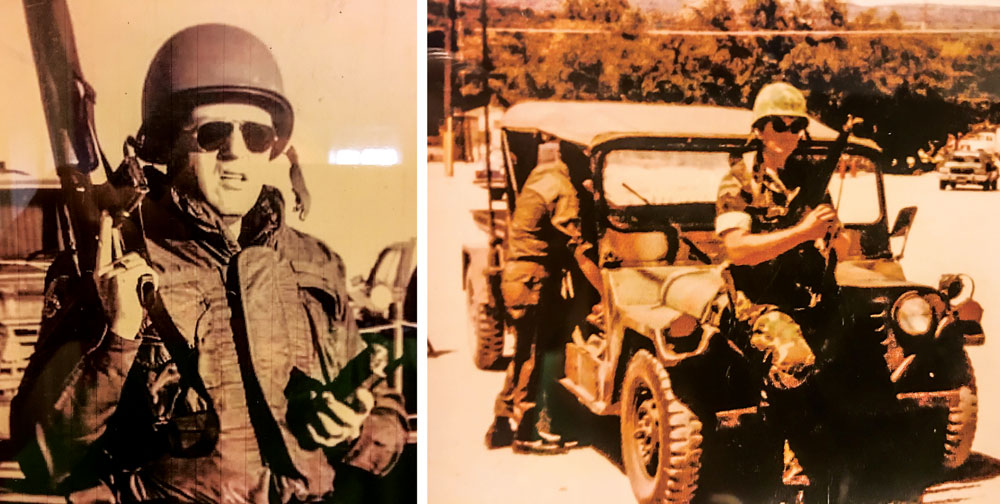
LEFT: Technical Sgt. Wolfe pictured at Ellsworth Air Force Base ca. 1978 at the SAC Bomb Comp Competition. RIGHT: Staff Sgt. Ben Wolfe ca. 1975 in combat training at the Security Police Academy in Camp Bullis, Texas.
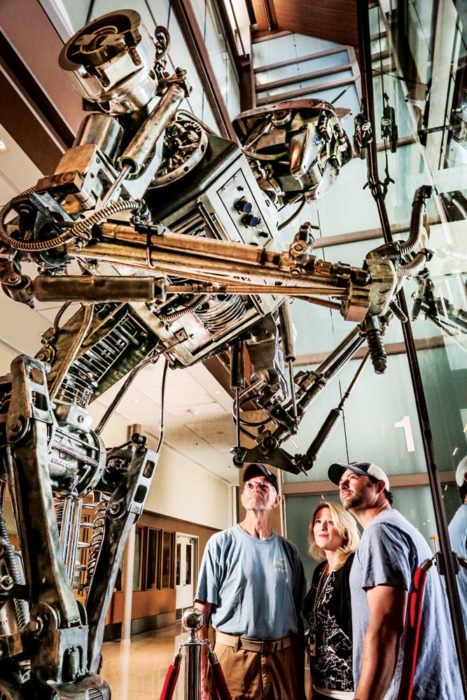
Veterans Ben Wolfe and Justin Moslet along with Dr. Tanya Miller consider “PTSD: Outside Looking In” by artist and veteran Rod Ford. Many of the VA’s walls are lined with veterans’ artworks as well.
Posttraumatic Stress Disorder or PTSD impacts up to 30% of veterans, according to the National Center for PTSD. It can take years to fully manifest, and may take decades for a vet to tackle through therapy. Two veterans share their stories about PTSD and its treatment at the Rocky Mountain Regional Veteran Administration (VA) Medical Center in Aurora.
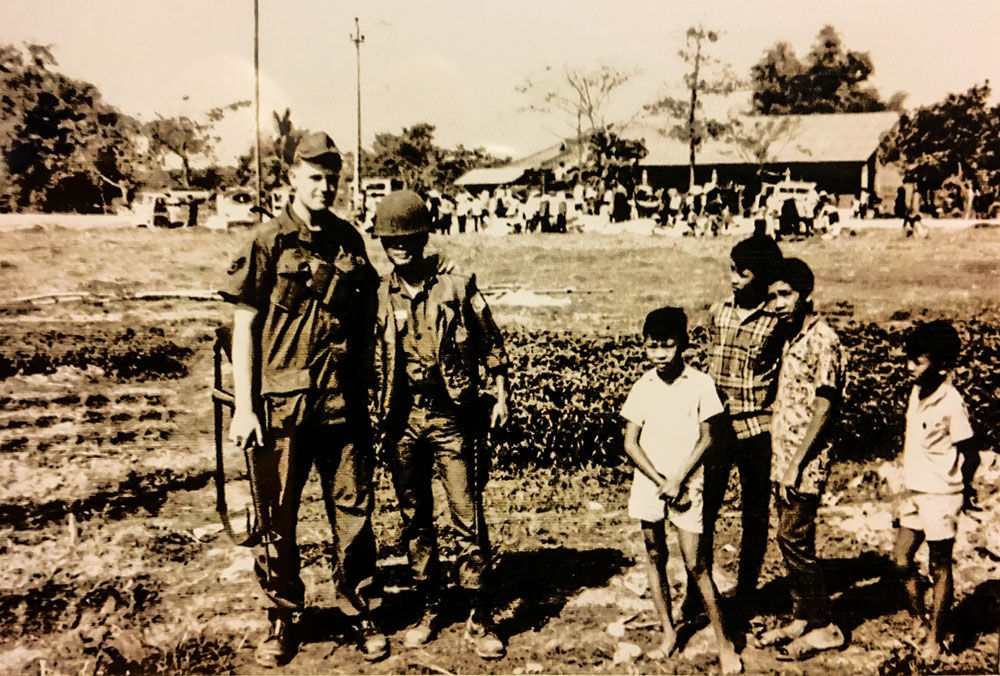
Staff Sgt. Wolfe participating in a MedCap Mission west of Saigon ca. 1969. Wolfe served one tour of duty in Vietnam as a medic during the Vietnam War.
The Rocky Mountain Regional Veteran Administration (VA) Medical Center’s gleaming tile floors and immaculate interiors contrast dramatically with the procession of veterans with prosthetics, canes, wheelchairs, and walkers in its halls. The warriors’ diversity—in terms of age, gender, ethnicity, and race—imparts a pluralistic portrait of our nation. An unspoken comradery permeates the halls, bridging the gap between old and young, male and female. The visible wounds of war, of course, do not encompass our veterans’ injuries, many of which don’t appear on their wizened faces or in their limbs’ limited mobility. “It’s insidious how it operates,” says VA psychologist and Stapleton parent Dr. Tanya Miller, when describing PTSD or Post-Traumatic Stress Disorder. “It’s slow and eventually saturates every facet of their life.”
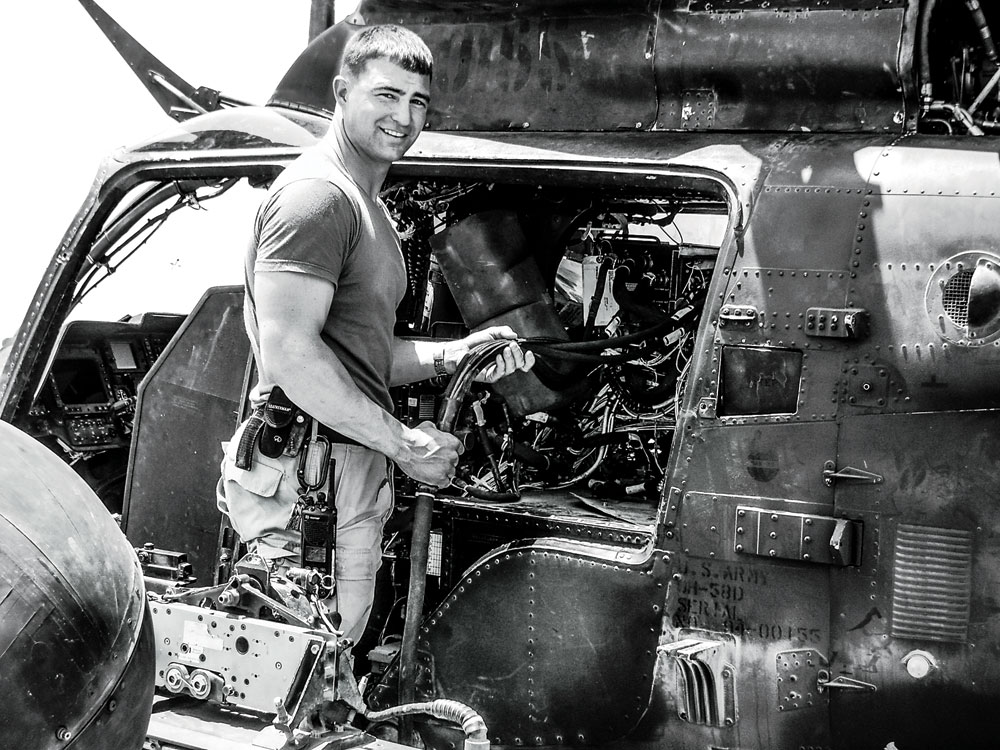
Sgt. Justin Moslet works on the electrical system of the OH-58(D) Kiowa Warrior near Tal-Afar, Iraq, ca. 2005.
Veterans Justin Moslet (US Army) and Ben Wolfe (US Air Force) served in different wars, different branches of the military, and are almost four decades apart in age. What they share is a deep love of the military, a pride in their service (both men say they would have liked to serve longer), and PTSD. Though PTSD has shaped their adult lives in significant ways, both decided that they would not allow it to define their lives further, and sought treatment at the VA.
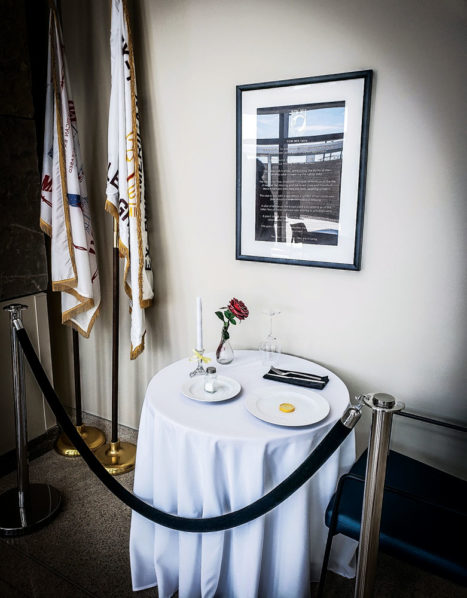
A table set for one sits outside of the VA’s restaurant, in honor of POWs and MIAs. The framed sign reads in part “This table set for one is small, symbolizing the frailty of one prisoner alone against his/her oppressors.”
For Wolfe, it was 50 years before he sought help. He enlisted in the USAF as a much younger man and served as a medic in Vietnam for one tour of duty (12 months). After returning to the States he became a drill instructor and enjoyed a long military career. “I never fired my weapon in Vietnam,” he says. Still, the onslaught of sounds—mortars, sirens, and helicopters carrying more wounded his way—combined with the wrecked bodies of young men, deeply affected him when he came home. Wolfe recalls episodes when he would freeze up while playing golf when he heard helicopters (Hueys and Chinooks) overhead. In time, even watching his favorite TV show (M*A*S*H) became impossible, since the helicopter sounds triggered his PTSD.
Wolfe retired after 23 years of service in 1982, and even after returning to civilian life, didn’t put a name to his “flashes of anger.” While employed, he says he was always “picking my people apart….I didn’t see it,” he says. “But people around me thought I was a real ass.” Though some of his peers who were ex-military shared their concerns with him, he could not recognize that he needed help from a trained professional. “There’s an ego thing too; we all think we can cure ourselves,” Wolfe observes.
Moslet was in basic training when 9/11 happened and served two tours of duty, in Operation Iraqi Freedom I and Operation Iraqi Freedom II. When asked what family members and others can do to help, he says “It’s nothing you can really say. It’s a point you have to come to. When you come home from combat, you’re still Rambo. When you get out of the military, you’re still transitioning….there’s usually an incident, some sort of reality check.” For Moslet, concern about how his PTSD was affecting his young daughter helped get him to walk through the doors of the VA to seek help. “One memory of being deployed would set me off; the crying would come on,” he says. “It’s hard to really come to grips with that when you don’t understand it, so you don’t know to seek help.”
“Even if you had a really benign military experience,” or a “cushy” post, Moslet says, you might have issues akin to those of a veteran who saw active combat. “It affects everybody,” he says, “a lot more people than are willing to admit it.” Though Moslet notes he did not feel he needed help after leaving the military, “These memories infuse everything, they get into every area of your life and you physically feel that anger or fear or anxiety.”
Though time heals many wounds, when it comes to trauma, the adage fails. “Trauma memories are not processed in the brain in the same way; they are not encoded in the same way. They are highly fragmented,” Miller says. “Having PTSD is like walking around with a Jack-in-the-box. You never know what is going to set it off, and it’s just popping out. And here [in treatment] we pull the lid off and we pull the stupid clown out and we look at it and we deal with it,” says Miller.
The VA offers two evidence-based treatments for PTSD. While different in their mechanisms of recovery, both Prolonged Exposure Therapy (PET) and Cognitive Processing Therapy (CPT) have repeatedly been found to significantly reduce symptoms of PTSD among veterans. Miller highlights that these treatments often differ from traditional psychotherapy in targeting trauma more directly, with PET operating as more of a “doing” therapy, and CPT more of a “thinking” therapy. These treatments provide veterans the opportunity to “speak about the unspeakable,” and ultimately, to change their relationship to the trauma. The painful process helps shed new light on past events, and thereby eviscerates the power of that traumatic memory.
Wolfe has strong advice for anyone suffering from PTSD: “Put your ego in your pocket and rely on somebody else….There are people who are trained who have an insight….If you have PTSD you can’t solve it yourself.”
Individual PET and CPT are available to veterans at the VA, and additional information can be found on the National Center for PTSD website (www.NCPTSD.VA.GOV). Veterans enrolled in VA care who are interested in mental health services can call 720-723-7310 for more information. If you are in crisis, call the Veteran Crisis Line at 1-800-273-8255 (press 1 for Veterans).



0 Comments